손가락 빨기, Thumb sucking(Finger sucking)
- 첫 돌 전후 영유아나 유치원에 들어가기 전 학령기전 유아들이 손가락(특히 엄지손가락)을 가끔 빠는 행동은 거의가 정상적이다.
- 손가락 빨기를 Thumb sucking 또는 Finger sucking이라고도 한다.
- 대부분 영유아들은 손가락을 빨기도 하고 발가락, 입술, 노리개 젖꼭지, 담요, 장난감 등을 빨기도 한다. 그런 행동 거의가 정상이다.
- 태어나서 3세까지 신생아들이나, 영유아들이 손가락을 가끔 빠는 행동도 거의가 정상적이다. 원시 반사, [부모도 반의사가 되어야 한다-소아가정간호백과]-제 3권 신생아, 영유아, 학령기 사춘기 아이들의 성장발육-구순기 참조.
- 태어나서부터 1~2살까지 신생아니 영유아가 손가락을 빨 때 입술이 자극받고 그로 인해 심리적 성적 쾌감을 느낄 수 있다.
- 프로이드 심리적 성적 쾌감 때문에 신생아나 영유아가 손가락을 빤다고 했다. 태아 초음파검사 기술이 있기 전 프로이드는 심리적 성적 쾌감 학설을 내 놓았다.
-
태아 초음파검사에서 자궁 속 태아가 손가락을 빠는 장면을 서 볼 수 있다(사진 2-1, 2-3).
- 첫 돌 후부터 유치원에 입학할 때까지 일부 유아들이 손가락을 더 심하게 빨기도 한다.
- 어떤 유아들은 TV에서 재미있는 장면을 볼 때나 잠들기 바로 전, 배고플 때, 아플 때, 또는 정서적으로 불안하거나 스트레스를 좀 더 받을 때 손가락을 더 심하게 빤다.
- 부모가 자기를 조건 없는 진정한 사랑을 많이 해 주지 않는다고 생각하거나 자기를 덜 보살펴 준다고 생각할 때, 자기에게 덜 관심 갖는다고 생각할 때, 자기를 조금도 사랑하지 않는다고 생각할 때, 새 동생을 볼 때 손가락을 더 많이 빨 수 있다.
- 정신적으로 긴장하고 불안하거나 정서적으로 어떤 문제를 가지고 있는 아이들이 유치원에 입학한 이후 스트레스를 계속 받으면 손가락을 계속 심하게 빨 수 있다.
- 손가락을 계속 심하게 빨면 치열 부정교합 등이 생길 수 있다.
- [부모도 반의사가 되어야 한다-소아가정간호백과]-제 20권 소아청소년 구강 치아 질병-부정교합 참조
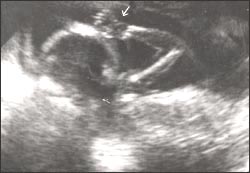
사진 2-1. 자궁 속 태아도 손가락을 빤다.
화살로 표시된 손가락을 빤다.
Copyright ⓒ 2011 John Sangwon Lee, MD., FAAP
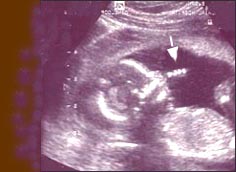
사진 2-2. 자궁 속 태아도 손가락을 빤다.
화살로 표시된 손가락을 빤다.
Copyright ⓒ 2011 John Sangwon Lee, MD,, FAAP
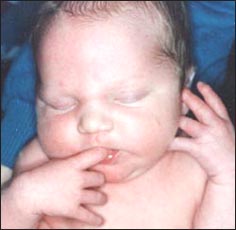
사진 2-3. 갓 태어난 아기들도 손가락을 빤다.
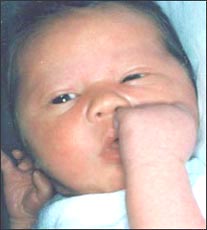
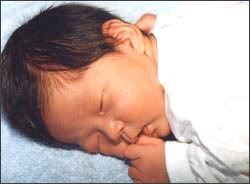
Copyright ⓒ 2012 John Sangwon Lee, MD., FAAP
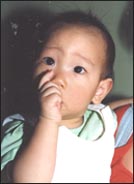
Copyright ⓒ 2012 John Sangwon Lee, MD., FAAP
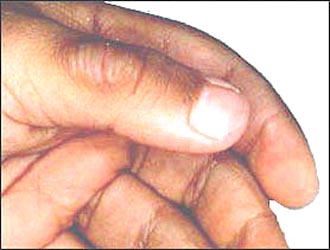
Copyright ⓒ 2012 John Sangwon Lee, MD., FAAP
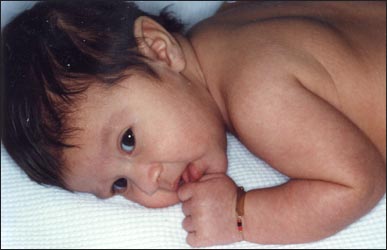
Copyright ⓒ 2012 John Sangwon Lee, MD., FAAP
손가락 빨기의 치료
- 첫 돌 이전 신생아나 영아가 손가락을 빠는 것은 거의가 정상이다.
- 첫 돌이 지난 후부터 유치원에 입학할 때까지 유아가 손가락을 가끔 빠는 것도 거의가 정상적이다.
- 유치원에 입학하기 전 유아가 손가락을 빨 때 손가락을 빤다고 조롱하든지, 벌준다든지, “손가락을 빨지 말라”라는 식으로 말로 타일러 손가락을 빨지 못하게 해서는 안 된다.
- 손가락에 쓴 약물을 바른다든지, 반창고 등으로 손가락을 감는다든지, 장갑을 끼워 손가락을 더 이상 빨지 못하게 하면 더 불안해진다. 어떤 방법으로든 강제로 손가락을 빨지 못하게 하면 일시적으로 손가락을 빨지 않을 수 있어도 나중에는 더 심하게 빨 수 있다.
- 첫 돌 후부터 유치원에 입학할 때까지 유아들이 손가락을 심하게 빨면, 그 유아들을 전보다 더 보살펴 주고 더 사랑해 주어야 한다.
- 부모가 자기를 조건 없이 진정으로 사랑한다고 확신할 수 있도록 많이 사랑해 해야 한다.
- 시간을 전보다 더 많이 내어 그 자녀와 더 많이 놀아 주어야 한다.
- 부부 간 불화가 많은 가정에서 자라는 유아들은 손가락을 더 심하게 빠는 경향이 있다.
- 이때 부부가 화목하면 유아들은 손가락을 자연히 덜 빨든지 더 이상 빨지 않는다.
- 유치원에 입학한 후 유아들이나 학령기 아이들이 손가락을 계속 심하게 빨면 소아정신과 전문의나 소아청소년과에서 상담해 문제를 해결해야 한다.
|
다음은 “엄지손가락을 빠는 아이”에 관한 인터넷 소아청소년 건강 상담 질의응답의 예 입니다. |
Q&A. 엄지손가락을 빠는 아이
Q.
안녕하세요? 저의 아들은 지금 26개월 되었습니다.
생후 4개월 정도부터 손 빨기를 좋아했어요. 1살이 넘어가면서 낮에는 거의 손을 빨지 않습니다. 하지만 잘 때는 꼭 손을 빨면서 자려고 합니다.
손을 빨면 손이 아프게 되니까 빨지 말라고 타이르면 네 하고 대답을 하지만 잘 때는 항상 한손에 늘 덮고 자는 이불을 잡고 다른 한손은 입으로 가져갑니다.
엄지손가락을 빠는 이 버릇을 잘 고칠 수 있는 방법은 없을 까요?
A.
우익님께
- 안녕하세요. 질문해 주셔 감사합니다.
- 자녀의 나이, 성별, 과거와 가족의 병력, 진찰소견, 임상검사 결과 등 많은 정보가 있으면 더 좋은 답변을 드릴 수 있습니다. 주신 정보를 참작해 답변을 드립니다.
- 영유아들이 손가락을 빠는 것은 거의가 정상 성장 발육 행동입니다.
- 왜 손가락을 빠는 이유는 확실히 모릅니다.
- 배고파서 빠는 것도 아닙니다.
- 프로이드 학설대로 심리적 성적 쾌감을 갖기 위해 손가락을 빠는 것도 아닙니다.
- 담배 피우는 사람들이 스트레스를 받으면 담배를 피우고 싶은 욕구가 생겨나는 것과 같이 영유아가 스트레스를 어떤 이유로 받을 때, 마음이 아플 때 손가락을 입안에 넣고 빨아 스트레스나 불안감을 해소시키는 행동과 비슷합니다.
- 자녀가 혼자 누워 잠을 자려고 할 때 여러 가지 생각, 걱정, 스트레스, 불안 등이 생겨 손가락을 더 빨게 되는 것 같습니다.
- 어떤 영유아는 다른 영유아들보다 손가락을 더 빨고 어떤 영유아들은 손가락을 덜 빨거나 아주 빨지 않습니다.
- 손가락을 빠는 영유아에게 말로 손가락을 빨지 말라고 타이른다든지 공갈을 친다든지 강제로 손가락을 빨지 못하게 하면 오히려 스트레스를 더 받아 더 빨든지 손가락 빠는 증상이외 다른 증상이 생길 수 있습니다.
- 손가락을 못 빨게 하는 특효약은 없습니다.
- 영유아를 전보다 더 많이 사랑해야 합니다.
- 눈길 접촉으로 신체적 접촉으로 집중적 관심적 사랑과 보살핌으로 더 많이 사랑해 주면 손가락을 덜 빨 것입니다.
- 잠자기 전 일정한 잠재우기 전 의식으로 수면 훈련을 시키고 덜 걱정하면서 잠들게 하면 손가락을 덜 빨게 될 것입니다.
- 영유아들 일부는 손가락을 빠는 대신 담요 등을 빨기도 하고 다른 방법으로 스트레스를 해소합니다.
- 소아청소년과에서 진찰 진단을 받으시고 문제에 관해 상담하시기 바랍니다.
- 참고로, 그러면 태아는 왜 손가락을 빨까?
- 저도 그 이유를 확실히 모르겠습니다.
- [부모도 반의사가 되어야 한다–소아가정간호백과]-제3권 신생아, 영유아, 학령기아, 사춘기아 성장 발육 육아-해당 연령의 성장 발육, 프로이드 정신 성욕 발달에 관한 학설, 구순기, 손가락 빨기.
- 제 22권 아들 딸 이렇게 키우세요–사랑, 잠 등을 참조하시기 바랍니다. 질문이 더 있으시면 다시 연락 주세요. 감사합니다. 이상원 드림
|
다음은 “잠자기 전 이불을 입에 넣고 빨아요”에 관한 인터넷 소아청소년 건강 상담 질의응답의 예 입니다. |
Q&A. 잠자기 전 이불을 입에 넣고 빨아요
Q.
- 지금 4살 된 남자 아이의 아버지 입니다.
- 얼마 전부터 잠자기 전 자꾸 이불을 빨면서 자려고 합니다.
- 그것도 조금 빠는 게 아니라 이불이 상당히 축축해 지는 정도로 계속 빨다가 잠이 들곤 하는데
- 왜 이런 행동을 하는 건지 궁금합니다.
A.
- 승연님
- 안녕하세요. 질문해 주셔서 감사합니다. 좋은 질문입니다.
- 자녀의 나이, 성별, 과거 병력, 가족 병력, 진찰소견, 임상검사 등의 정보를 많이 알수록 답변을 드리는데 도움이 됩니다. 주신 정보를 토대로 해서 답변을 드리겠습니다.
- 왜 그런 행동을 하는지 확실히 알 수 없습니다.
- 소아청소년들 일부는 손가락 빨기나 손가락이나 손톱 물어뜯기,
- 입술 물어뜯기,
- 머리카락 잡아 빼기 등의 행동을 하기도 합니다.
- 마음 속 깊이 있는 불안, 걱정, 분노, 스트레스 등을 표출하는 방법으로 그런 행동을 할 수 있습니다.
- 요즘 풍요로운 삶을 영유하는 아이들에게도 생기는 정신 정서적인 문제들입니다.
- 새 동생을 보거나 부모 형제자매 가족들 중 누군가가 사망하거나 부모 간 불화가 심하거나 어디로 이사 가거나 학교를 처음 다니기 시작하거나 부모의 사랑을 충분히 받지 못하거나, 그릇된 사랑을 받는 소아청소년들에게 그런 행동이 생길 수 있습니다.
- 아빠나 엄마가 자녀 하나만 데리고 구경 가든지 음식점에 가든지 또는 다른 방법으로 그 자녀 하나를 이 세상에서 가장 중요한 자녀라고 사랑해서 그 자녀도 그런 부모 사랑을 느낄 수 있도록 집중적 관심적 사랑과 보살핌을 해주십시오.
- 이렇게 부모가 한 자녀만 데리고 집중적 관심적 사랑을 해 줄 때 아마 자녀가 왜 그렇게 화가 났는지 왜 스트레스를 많이 받았는지 마음속 깊이 간직한 불안 등을 부모에게 말할 수 있을 것입니다.
- 그 후 적절히 그 자녀가 받고 있는 스트레스나 가지고 있는 근심걱정을 풀어 주십시오.
- 그렇지 않으면 소아청소년과에서 상담 치료를 해 주시기 바랍니다.
- [부모도 반의사가 되어야 한다– 소아가정간호백과]-제 3권 신생아, 영유아, 학령기아, 사춘기아, 성장발육 육아-아수본 형 누나 언니 오빠에게. 제 22권 아들 딸 이렇게 사랑해키우세요–사랑. 교조증(손톱을 물어뜯는 버릇), 손가락 빨기 등을 참조하시기 바랍니다. 질문이 더 있으면 다시 연락해 주시기 바랍니다. 감사합니다. 이상원 드림
|
다음은 “손가락을 빠는데”에 관한 인터넷 소아청소년 건강 상담 질의응답의 예 입니다. |
Q&A. 손가락을 빠는데
Q.
- 오늘로 백일이 된 사내아이입니다.
- 3개월 정도면 손가락 빠는 게 당연한거라고 책에서 보긴 했는데 아기가 좀 심한 것 같아서요.
- 엄지 손가락을 양쪽 번갈아가며 정말 큰아이가 빨듯이 빠는데 버릇이 될까봐 걱정입니다.
- 주위에서 3-4살까지 손가락을 빨아 지문이 없어질 정도가 되는 걸 종종 봤거든요.
- 어떤 책에는 애정결핍이 있는 애들이 종종 손가락을 빨기도 한다는데 걱정이네요.
- 노리개 젖꼭지를 물려보기도 하는데 그것도 별로 좋은 건 아닌 것 같구요.
- 어떤 방법이 없을까요. 나름대로 정을 많이 준다고는 하는데 정말 제가 부족해서 그런 건지.
- 답변 부탁합니다..
A.
- 유진맘께
- 안녕하세요. 좋은 질문해 주셔서 감사합니다. 아기의 나이, 성별, 과거 병력, 가족 병력, 진찰소견, 임상검사 등의 정보를 많이 알수록 답변을 드리는데 도움이 됩니다.
- 주신 정보를 참작해서 답변을 드리겠습니다. 질문 내용이 아주 좋습니다.
- 저는 될 수 있으면 손가락을 빠는 것이 노리개 젖꼭지를 빠는 것보다 더 자연스럽다고 생각합니다. 그래서 노리개 젖꼭지를 영유아들에게 빨라고 주는 것을 권장하지 않습니다. 그러나 반대하지는 않습니다.
- 영유아들이 3~4세까지 손가락을 빠는 것은 거의가 정상입니다.
- 때로는 타고난 기질, 질병, 정서, 사랑 결핍 등에 따라 영유아들이 손가락을 보통 이상으로 더 심하게 빨기도 합니다.
- 생후 3개월 영아들이 손가락을 빠는 것은 극히 정상적입니다.
- 아기를 포근히 안고 엄마의 눈을 아기의 눈에 맞추고 사랑스런 말을 하면서 젖을 먹이면서 조건 없는 진정한 사랑을 매일매일 많이 해 주시면 손가락을 덜 빨을 수 있을 것입니다.
- 이렇게 사랑해서 양육하면 곧 차이가 날 것입니다.
- 그래도 조금씩 빨아도 걱정하실 것 없습니다. [부모도 반의사가 되어야 한다–소아가정간호백과]-제 3권 신생아, 영유아, 학령기아, 사춘기아 성장 발육 육아–해당 연령의 성장 발육, 프로이드 성심리 발달에 관한 학설. 손가락 빨기, 제 20권 소아청소년 구강 치아 질병–노리개 젖꼭지(Pacifier)를 빠는 버릇 등을 참조하시기 바랍니다. 소아청소년과에서 진찰 진단 치료를 받고 상담하시기 바랍니다. 질문이 더 있으시면 다시 연락 주세요. 감사합니다. 이상원 드림
|
다음은 “아기 손 빠는 것에 대해서”에 관한 인터넷 소아청소년 건강 상담 질의응답의 예 입니다. |
Q&A. 아기 손 빠는 것에 대해서
Q.
- 아기가 이제 26개월이 되는데요. 낳구 나서 공갈 젖꼭지를 빨다가 그걸 자꾸 잊어버리니까 자기 손을 빨더라구요. 그 땐 아기 때는 습관처럼 그럴 수 있다 생각해서 그냥 내버려두기도 하고 떼 볼려고 40분씩 우는 걸 잡아보기도 했어요.
- 관심을 다른데 끌어 볼려고도 해봤고 쓴 약을 묻혀놓고 사람들이 말하는 방법이란 방법을 다써봤는데 안 되더라구요. 요즘은 말로만 하는데 자꾸 어른들이 보지 않는데서 빨기도 하고 잠을 잘 땐 엄마를 쳐다보지 않고 잔답니다. 어떻게 해야 뗄지. 그리고 언제쯤 말을 알아들을지 모르겠어요. 26개월 치곤 말을 꽤 잘하는 남자아이거든요.
- 정서적으로 문제가 되겠거니 해서 최근엔 모른 척 하고 있는데 그렇게 지나치려니 빠는 손가락 두개가 다른 손가락에 비해 길구요. 이도 벌어지구 해서요. 유치원생이지만 넘 걱정되네요.
- 그리구 밥을 잘 안 먹는데 책을 읽어주겠다던지 먹으면 사탕을 주겠다던지 이런 식의 조건성 말들은 괜찮은 건가요? 감사합니다.
A.
- 문호님
- 안녕하세요. 질문해 주셔서 감사합니다. 좋은 질문입니다.
- 자녀의 나이, 성별, 과거 병력, 가족 병력, 진찰소견, 임상검사 등의 정보를 많이 알수록 답변을 드리는데 도움이 됩니다. 주신 정보를 토대로 해서 답변을 드리겠습니다.
- 3~4세 영유아들이 손가락을 빠는 것과 노리개 젖꼭지(공갈 젖꼭지)를 빠는 것은 아주 정상적입니다.
- 때로는 더 심하게 빨기도 하고 다른 영유아들보다도 유난히 더 빨기도 합니다.
- 영유아들은 무엇에 정서적 애착심을 갖기 위해서 손가락 등을 빤다고 합니다.
- 하여튼 손가락이나 노리개 젖꼭지를 빨 때 가지고 있는 스트레스와 불안 걱정이 어느 정도 해소되는 줄로 압니다.
- 어떤 영유아들은 손가락이나 노리개 젖꼭지뿐만 아니라 덮고 자는 담요 등을 빨기도 합니다.
- 이 모든 행동은 정신적으로 스트레스를 더 많이 받을 때 더 많이 나타납니다.
- 부모들의 조건 없는 진정한 사랑을 많이 받고 자라는 영유아들도 부모로부터 조건적 사랑을 받고 자라는 영유아들도 손가락 빠는 행동을 할 수 있습니다.
- 그러나 그들은 부모로부터 조건 없이 진정한 사랑을 충분히 받지 않는다고 생각하거나 부모의 눈길 접촉사랑, 신체적 접촉사랑 그리고 집중적 관심적 사랑과 보살핌을 충분히 받지 못한다고 생각하면서 자라는 아이들은 이런 행동을 더 할 수 있습니다.
- 실컷 빠르라고 노리개 젖꼭지를 신생아들에게, 영유아들에게 줄 필요는 없지만 손가락을 빨 때 손가락을 빨지 말라고 꾸지람을 치지 말고 손가락에 쓴 맛이 나는 약 같은 것을 바르지도 말고 손가락을 싸주지도 마십시오.
- 그 대신 엄마의 눈길 접촉사랑을 더 많이 해주시고 꼭 안아주고 뽀뽀해주는 등 신체적 접촉 사랑을 더 많이 해주고 그 자녀가 가진 사랑 탱크가 철철 넘도록 조건 없는 사랑으로 사랑 탱크를 채워 주십시오.
- 이렇게 조건 없는 진정한 사랑을 많이 해주는 양육은 손가락 빠는 습관을 치료하는 데 특효약이고 장차 성장해서 성인이 된 후 생산적 사회 일원이 되는데 필 수 품이 되는 것입니다.
- 뿐만 아니라 건전한 자부심을 갖고 살 수 있는 힘을 줍니다.
- 어렸을 때 받았던 부모의 따뜻한 눈길 접촉사랑과 신체적 접촉사랑이 얼마나 많고 좋았는지 에 따라 성공적인 삶을 영유할 있습니다.
- 조건적 사랑은 조건 있는 사랑으로 되돌아옵니다.
- 마치 주먹이 거울에 비치면 주먹이 반사되고 웃는 얼굴이 거울에 비치면 웃는 얼굴이 반사되고 조건 없는 사랑을 받은 자녀는 조건 없는 사랑을 남들에게 줄 줄 압니다.
- 어린 자녀가 크건 작건 뚱뚱하건 빼빼하건 병신이건 아니건 장차 유망할 것 같건 유망하지 않을 것 같건 딸이건 아들이건 관계없이 사랑을 해 주는 것이 조건 없는 사랑입니다.
- 막나니 짓을 하던 항시 예쁜 짓을 하든 관계없이 항시 사랑해 주는 것이 조건 없는 사랑입니다.
- 우리들은 이런 조건 없는 사랑을 모든 자녀들에게 100%할 수는 없지만 100%에 가깝게 하도록 노력해야 합니다.
- 조건적으로 사랑을 받고 자란 아이들은 남을 조건적으로 대하고 나중에는 부모와의 관계도 조건적으로 관계를 갖습니다. 이 얼마나 무서운 일입니까.
- 부모 자녀 관계나 부부관계에서는 가능한 한 조건 없는 사랑 관계로 이루어져야 합니다.
- 이런 관계가 조건 없는 사랑관계로 이루어지지 않은 부모 자녀 관계나 부부관계는 절망적인 결과를 낳을 수 있습니다.
- 조건 없는 진정한 사랑을 충분히 받은 아이들은 인내심이 강하고 남을 사랑할 줄을 알고 이 험난한 세상을 헤치고 나갈 때 남들에게 이용을 당하지 않고 살 수 있습니다.
- 며칠 전 조국에서 조건적 결혼을 하는 여성들이 많다는 신문기사를 읽었습니다.
- 이 얼마나 서글픈 사랑관계 입니까?
- 조건 있는 사랑은 진정한 사랑이 아닙니다.
- 아기 자녀의 문제에 대해서 단골 소아청소년과에서 상담하시기 바랍니다.
- 그리고 [부모도 반의사가 되어야 한다–소아가정간호 백과]-제 3권 신생아, 영유아,학령기아, 사춘기아 성장발육 육아–해당 연령의 성장 발육, 생후 1개월~6세 아이들의 발육 이정표. 프로이드의 정신 성욕 발달에 관한 학설. 제 22권 아들 딸 이렇게 사랑해 키우세요–사랑. 조건 없는 사랑을 참조하시기 바랍니다. 그리고 질문이 더 있으면 다시 연락해 주시기 바랍니다. 감사합니다. 이상원 .
Finger sucking, Thumb sucking
• It is almost normal for infants to suck their fingers (especially their thumbs) before and after their first birthday or before entering kindergarten.
• Finger sucking is also called thumb sucking or finger sucking.
• Most infants and toddlers suck on their fingers, but also on their toes, lips, soother, blankets, and toys. Almost all of that behavior is normal.
• From birth to 3 years of age, it is almost normal for newborns and young children to occasionally suck their fingers. Primitive reflexes, www.drleepediatrics.com- Volume 3 Growth and Development of Newborns, Infants, and School-age Adolescents – Refers to the oral period.
• From birth to 1 to 2 years of age, when babies suck their fingers, their lips are stimulated and they can feel psychological and sexual pleasure.
• Freud said that newborns and infants suck their fingers for psychological and sexual pleasure. Before fetal sonography, Freud proposed the theory of psychological and sexual pleasure.
• In fetal ultrasound, the fetus in the womb can be seen sucking fingers (Pictures 2-1 and 2-3).
• Some infants suck their fingers more severely from their first birthday until entering kindergarten.
• Some toddlers suck their fingers harder while watching a funny scene on TV, just before going to bed, when hungry, sick, or when they are emotionally disturbed or stressed.
• When you think your parents don’t give you a lot of unconditional true love or careless, when you think you are careless, when you think they don’t love you at all, when you see your new sibling, put your finger on more Can wash a lot.
• Children who are mentally tense, anxious, or have some emotional problem may continue to suck their fingers if they continue to be stressed after entering kindergarten.
• If you continue to suck your fingers vigorously, dental malocclusion may occur.
www.drleepediatrics.com] – See Volume 20 Oral and Dental Diseases in Children and Adolescents – Malocclusion

Picture 2-1. Even the fetus in the womb sucks its fingers. Suck the finger indicated by the arrow. Copyright ⓒ 2011 John Sangwon Lee, MD., FAAP

Photo 2-2. Even the fetus in the womb sucks its fingers. Suck the finger indicated by the arrow. Copyright ⓒ 2011 John Sangwon Lee, MD, FAAP

Photo 2-3. Even newborn babies suck their fingers.

Photo 2-4. Even 1-month-olds suck their fingers.

Photo 2-6. Even 2-month-old babies suck their fingers normally. Copyright ⓒ 2012 John Sangwon Lee, MD., FAAP

Photo 2-6-2. Even 9-month-old babies suck their fingers normally. Copyright ⓒ 2012 John Sangwon Lee, MD., FAAP

Photo 2-9. Even a 4-year-old baby sucked his fingers and got fat on his thumb. Copyright ⓒ 2012 John Sangwon Lee, MD., FAAP

Photo 2-10. Even 9-month-olds suck their fingers. Copyright ⓒ 2012 John Sangwon Lee, MD., FAAP
Finger sucking treatment
• It is almost normal for newborns or infants to suck their fingers before their first birthday.
• It’s almost normal for toddlers to suck their fingers occasionally after their first birthday through kindergarten.
• Before Kindergarten, when sucking a toddler’s finger, don’t stop sucking Tyler’s finger by mocking, punishing, or saying “don’t suck your finger”.
• I get more anxious when I put drugs on my fingers, wrap my fingers with a band-aid, or put on gloves so I can’t suck my fingers anymore. If you forcefully stop sucking your finger in any way, you may be able to stop sucking your finger temporarily, but you may end up sucking harder in the future.
• If children suck their fingers badly from their first birthday until entering kindergarten, they should be looked after and loved more than before.
• You must love your parents so much that you can be sure that they truly love you unconditionally.
• Make more time to play with your child than ever before.
• Infants who grow up in families with a lot of marital discord tend to suck their fingers more severely.
• If the couple is reconciled at this time, the infants will naturally suck their fingers less or no longer.
• If infants or school-age children continue to suck their fingers heavily after entering kindergarten, consult a pediatric psychiatrist or pediatrician to solve the problem.
The following is an example of a Q&A for health counseling for children and adolescents on the Internet about “thumb-sucking child”.
Q&A. kid sucking thumb
Q. Hello? My son is now 26 months old. From around 4 months of age, he liked to suck his hands.
As he turns 1 year old, he rarely washes his hands during the day. But when he sleeps, he always tries to sleep while washing his hands. Washing your hands hurts your hands, so if you tell them not to wash them, you say yes, but when you sleep, you always cover them in one hand, hold the blanket, and bring the other hand to your mouth. Is there any good way to break this thumb-sucking habit?
A. to the right
• Hello. Thank you for asking a question.
• We can give you a better answer if you have a lot of information such as the child’s age, gender, past and family medical history, examination findings, and clinical test results. We will respond based on the information you have provided.
• Finger sucking in infants and young children is almost always a normal developmental behavior.
• Not sure why you suck your finger.
• You don’t suck because you’re hungry.
• Neither does sucking your finger for psychological sexual pleasure, as Freud said.
• It is similar to the behavior of infants and young children when they are under stress for some reason or when they are upset, sucking their fingers into their mouths to relieve stress or anxiety, such as when people who smoke cigarettes are stressed and want to smoke.
• When your child lies on his own and tries to sleep, thoughts, worries, stresses, anxiety, etc., seem to cause him to suck his fingers more.
• Some infants and toddlers suck their fingers more than others, and some infants suck less or not very much.
• Infants who suck their fingers are verbally instructed not to suck their fingers, bullied, or forcibly prevented from sucking their fingers.
• There is no cure for sucking your fingers.
• We need to love our children more than ever before.
• If you give more love through eye contact, physical contact, focused attention, and care, you will suck your fingers less.
• Conscious sleep training before going to bed and a less worrying sleep will help you suck your fingers less.
• Instead of sucking their fingers, some infants and toddlers suck on blankets and other ways to relieve stress.
• Please visit the Department of Pediatrics for a diagnosis and discuss the problem.
• For reference, then why does the fetus suck its fingers?
• I’m not quite sure why.
• [Parents should also become at least the half-doctors – Encyclopedia of Pediatric and Family Nursing] – Volume 3 Newborns, Infants, School-age Children, Adolescents Growth and Development Parenting – Growth and development at the age, Freud’s theory on the development of mental sexuality, oral hygiene, finger sucking.
• See Book 22, Raising Sons and Daughters Like This—Love, Sleep, and More. If you have any more questions, please contact us again. thank you. Lee Sang-won.
The following is an example of Internet pediatric health counseling Q&A on “I put a blanket in my mouth and suck it before going to sleep”.
Q&A. I put a blanket in my mouth and wash it before going to sleep
Q
• I am the father of a boy who is now 4 years old.
• It’s been a while since I tried to sleep while washing the blankets before going to bed. • It’s not that I wash it a little, but I keep washing it to the extent that the blanket becomes quite wet and then I fall asleep.
• I wonder why they are doing this.
A.
• Seungyeon
• Hello. Thanks for asking. That’s a good question.
• The more information you have, such as your child’s age, gender, past medical history, family history, examination findings, and clinical tests, the more helpful it is to give you an answer. We will give you an answer based on the information you provided.
• I’m not sure why I’m acting the way I do.
• Some children and adolescents may experience finger sucking, finger or nail-biting,
• lip biting;
• They do things such as pulling hair out.
• It can be done as a way to express deep-seated anxiety, worry, anger, or stress.
• These are the psycho-emotional problems that occur even in children who are leading an affluent life these days.
• Do not do this to children who see a new sibling, when someone in their parent sibling family dies, parental rift is severe, moves to a new place, starts school, doesn’t get enough parental love, or is mistreated. can happen.
• Whether a father or mother takes one child to a visit, to a restaurant, or otherwise loves that child as the most important child in the world, give him intensive love and care so that he or she can feel that parental love.
• When a parent takes only one child and gives them intensive love, perhaps they can tell the parent why the child is so angry, why he is stressed, and the anxiety he holds in his heart.
• Then, appropriately relieve the child’s stress or concerns.
• Otherwise, please consult the Pediatrics Department.
www.drleepediatrics.com- Volume 3 Newborns, Infants, School-age Children, Adolescents, Growth and Development Parenting- To Asubon older sister, older sister and older brother. Book 22 Raising Sons and Daughters to Love Like This – Love. See also nail-biting habits, finger-sucking, etc. If you have any further questions, please contact us again. thank you. Lee Sang-won Dream The following is an example of a Q&A for children’s health consultation on the Internet about “sucking your finger”.
Q&A. sucking my finger
Q.
• This is a boy who has turned 100 today.
• I read in a book that sucking fingers is normal around 3 months, but I think the baby is a bit harsh.
• I’m afraid I’ll get into the habit of sucking my thumbs alternately like an older child.
• I’ve often seen people around me suck their fingers by the age of three or four, until their fingerprints disappear.
• I’m worried that some books show that children with a lack of affection often suck their fingers.
• I try biting on the soother’s pacifier, but that doesn’t seem very good either.
• Is there any way? They say they give me a lot of affection, but maybe it’s because I’m really lacking.
• please answer me..
A.
• Dear Eugene
• Hello. Thanks for the nice question. The more information you know about the baby’s age, sex, past medical history, family history, examination findings, and clinical tests, the more helpful it is to give you an answer.
• We will respond to you taking into account the information you have given us. Your question is very good.
• If possible, I feel that sucking a finger is more natural than sucking a soother. Therefore, it is not recommended to give a soother pacifier to young children early. But I am not against it.
• It is almost normal for young children to suck their fingers by the age of three or four.
• Sometimes infants and young children suck their fingers more than normal, depending on their natural temperament, illness, emotions, lack of love, etc.
• It is extremely normal for 3-month-old infants to suck their fingers.
• If you give your baby a hug, close your eyes to your baby’s, and give her a lot of unconditional love every day, while feeding her with sweet words, you will be able to suck your fingers less.
• If you love and nurture like this, you will soon see a difference.
• Even if you wash it little by little, there is nothing to worry about www.drleepediatrics.com-Vol. 3 Newborns, infants, school-age children, adolescents, growth and development Parenting-Theories on growth and development at the age, Freud’s theory of sexual psychology. Please refer to Finger Sucking, Volume 20 Children and Adolescents Oral Dental Diseases-Pacifier Sucking Habits, etc. Please consult with the Department of Pediatrics for diagnosis, diagnosis and treatment. If you have any more questions, please contact us again. thank you. Lee Sang-won.
The following is an example of Q&A for health counseling for children and adolescents on the Internet regarding “About sucking a baby’s hand”.
Q&A. about sucking a baby’s hand
Q.
• Your baby is now 26 months old. After giving birth, I sucked on the pacifier, but I kept forgetting it, so I sucked my own hands. At that time, I thought it could be like a habit when I was a baby, so I left it alone or tried to catch 40 minutes of crying to watch.
• I’ve tried to draw attention elsewhere, and I’ve tried all kinds of ways to put the bitter medicine on and people say, but to no avail. These days, I only talk, but I keep sucking because adults aren’t looking, and when I sleep, I sleep without looking at my mom. how do i take it off And I don’t know when I’ll understand. For a 26-month-old boy, he’s pretty good at talking.
• I’ve been pretending not to know lately because I thought it would cause emotional problems, but to go too far, my two sucking fingers are longer than the other fingers. I want to earn this too. I’m a kindergartener, but I’m very worried.
• I don’t eat often, so are conditional words like reading a book or giving me candy if I eat it okay? thank you.
A.
• Mr. Moon
• Hello. Thanks for asking. That’s a good question.
• The more information you have, such as your child’s age, gender, past medical history, family history, examination findings, and clinical tests, the more helpful it is to give you an answer. We will give you an answer based on the information you provided.
• It is quite normal for 3 to 4-year-olds to suck on their fingers and sucking on the soother.
• Sometimes they suck harder and sometimes they suck more than other infants and toddlers.
• Infants and toddlers are said to suck their fingers and the like to become emotionally attached to something.
• In any case, I know that sucking your finger or soother relieves some of the stress and anxiety you may have.
• Some infants and toddlers suck on their fingers and soothers, as well as blankets and sleeping bags.
• All of these behaviors are more pronounced when you are more mentally stressed.
• Infants and toddlers who grow up receiving a lot of unconditional love from their parents and children who grow up receiving unconditional love from their parents can also do finger sucking.
• However, children who grow up thinking that they do not receive enough genuine and unconditional love from their parents or that they do not receive enough parental eye contact, physical contact, and focused attention love and care may be more likely to do this.
• You don’t have to give pacifiers to newborns or toddlers to be quick, but when sucking, don’t scold them for not sucking your fingers, don’t put bitter medicine on your fingers, and don’t wrap your fingers around them.
• Instead, give your mother more eye contact, give her more physical touch, such as hugs and kisses, and fill her love tank with unconditional love so that her child’s love tank is full.
• Nurturing a lot of unconditional and true love is an effective remedy for the thumb-sucking habit, and it will become a necessity when you grow up and become an adult and become a productive member of society.
• It also gives you the strength to live with healthy self-esteem
. • You can lead a successful life depending on how much and good your parents’ warm gaze and physical contact love you received when you were young.
• Conditional love returns to conditional love.
• As if a fist is reflected in a mirror, a smiling face is reflected in a mirror, and a child who receives unconditional love knows how to give unconditional love to others.
• Love is unconditional love, regardless of whether a young child is big or small, fat or skinny, sick or not, promising or unpromising, daughter or son.
• Unconditional love is always giving love, regardless of whether you’re the youngest or always pretty.
• We cannot give 100% of this unconditional love to all of our children, but we should try to be close to 100%
. • Children who grow up receiving conditional love treat others conditionally, and later have conditional relationships with their parents as well. How scary is this?
• Parent-child relationships and marital relationships should be as unconditional as possible.
• A parent-child relationship or marital relationship where this relationship is not an unconditional love relationship can have disappointing results.
• Children who have received enough unconditional and true love are patient and know how to love others so that they can live without being taken advantage of by others as they navigate this difficult world.
• A few days ago, I read a newspaper article that said that there are many women who marry conditionally in their homeland.
• How sad is this love relationship?
• Conditional love is not true love.
• Consult with your regular Pediatrics Department about your baby’s problems.
• And www.drleepediatrics.com- Volume 3 Newborns, Infants, School-age Infants, Adolescents Growth and Development Parenting – Growth and development at the appropriate age, milestones in the development of children aged 1 month to 6 years. Freud’s theory on the development of psychosexuality. Book 22 Raise your sons and daughters by loving them like this – love. See Unconditional Love. And if you have any more questions, please feel free to contact me again. thank you. Lee Sang-won.
출처와 참조 문헌 Sources and references
- NelsonTextbook of Pediatrics 22ND Ed
- The Harriet Lane Handbook 22ND Ed
- Growth and development of the children
- Red Book 32nd Ed 2021-2024
- Neonatal Resuscitation, American Academy Pediatrics
- www.drleepediatrics.com 제1권 소아청소년 응급 의료
- www.drleepediatrics.com 제2권 소아청소년 예방
- www.drleepediatrics.com 제3권 소아청소년 성장 발육 육아
- www.drleepediatrics.com 제4권 모유,모유수유, 이유
- www.drleepediatrics.com 제5권 인공영양, 우유, 이유식, 비타민, 미네랄, 단백질, 탄수화물, 지방
- www.drleepediatrics.com 제6권 신생아 성장 발육 육아 질병
- www.drleepediatrics.com제7권 소아청소년 감염병
- www.drleepediatrics.com제8권 소아청소년 호흡기 질환
- www.drleepediatrics.com제9권 소아청소년 소화기 질환
- www.drleepediatrics.com제10권. 소아청소년 신장 비뇨 생식기 질환
- www.drleepediatrics.com제11권. 소아청소년 심장 혈관계 질환
- www.drleepediatrics.com제12권. 소아청소년 신경 정신 질환, 행동 수면 문제
- www.drleepediatrics.com제13권. 소아청소년 혈액, 림프, 종양 질환
- www.drleepediatrics.com제14권. 소아청소년 내분비, 유전, 염색체, 대사, 희귀병
- www.drleepediatrics.com제15권. 소아청소년 알레르기, 자가 면역질환
- www.drleepediatrics.com제16권. 소아청소년 정형외과 질환
- www.drleepediatrics.com제17권. 소아청소년 피부 질환
- www.drleepediatrics.com제18권. 소아청소년 이비인후(귀 코 인두 후두) 질환
- www.drleepediatrics.com제19권. 소아청소년 안과 (눈)질환
- www.drleepediatrics.com 제20권 소아청소년 이 (치아)질환
- www.drleepediatrics.com 제21권 소아청소년 가정 학교 간호
- www.drleepediatrics.com 제22권 아들 딸 이렇게 사랑해 키우세요
- www.drleepediatrics.com 제23권 사춘기 아이들의 성장 발육 질병
- www.drleepediatrics.com 제24권 소아청소년 성교육
- www.drleepediatrics.com 제25권 임신, 분만, 출산, 신생아 돌보기
- Red book 29th-31st edition 2021
- Nelson Text Book of Pediatrics 19th- 21st Edition
- The Johns Hopkins Hospital, The Harriet Lane Handbook, 22nd edition
- 응급환자관리 정담미디어
- Pediatric Nutritional Handbook American Academy of Pediatrics
- 소아가정간호백과–부모도 반의사가 되어야 한다, 이상원 저
- The pregnancy Bible. By Joan stone, MD. Keith Eddleman, MD
- Neonatology Jeffrey J. Pomerance, C. Joan Richardson
- Preparation for Birth. Beverly Savage and Dianna Smith
- 임신에서 신생아 돌보기까지. 이상원
- Breastfeeding. by Ruth Lawrence and Robert Lawrence
- Sources and references on Growth, Development, Cares, and Diseases of Newborn Infants
- Emergency Medical Service for Children, By Ross Lab. May 1989. p.10
- Emergency care, Harvey Grant and Robert Murray
- Emergency Care Transportation of Sick and Injured American Academy of Orthopaedic Surgeons
- Emergency Pediatrics A Guide to Ambulatory Care, Roger M. Barkin, Peter Rosen
- Quick Reference To Pediatric Emergencies, Delmer J. Pascoe, M.D., Moses Grossman, M.D. with 26 contributors
- Neonatal resuscitation Ameican academy of pediatrics
- Pediatric Nutritional Handbook American Academy of Pediatrics
- Pediatric Resuscitation Pediatric Clinics of North America, Stephen M. Schexnayder, M.D.
-
Pediatric Critical Care, Pediatric Clinics of North America, James P. Orlowski, M.D.
-
Preparation for Birth. Beverly Savage and Dianna Smith
-
Infectious disease of children, Saul Krugman, Samuel L Katz, Ann A.
- 제4권 모유, 모유수유, 이유 참조문헌 및 출처
- 제5권 인공영양, 우유, 이유, 비타민, 단백질, 지방 탄수 화물 참조문헌 및 출처
- 제6권 신생아 성장발육 양호 질병 참조문헌 및 출처
-
Neurology in Pediatrics, P. F. Bray, Yearbook Medical Publishers
-
Behavior Disorders in Children, Bakwin and Bakwin
- 소아과학 대한교과서
- 의학 용어사전 대한 의사 협회
Copyright ⓒ 2014 John Sangwon Lee, MD., FAAP
“부모도 반의사가 되어야 한다”-내용은 여러분들의 의사로부터 얻은 정보와 진료를 대신할 수 없습니다.
“The information contained in this publication should not be used as a substitute for the medical care and advice of your doctor. There may be variations in treatment that your doctor may recommend based on individual facts and circumstances.
“Parental education is the best medicine.